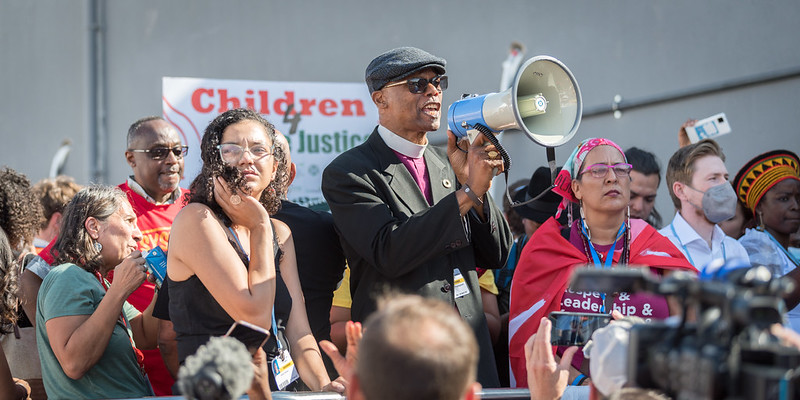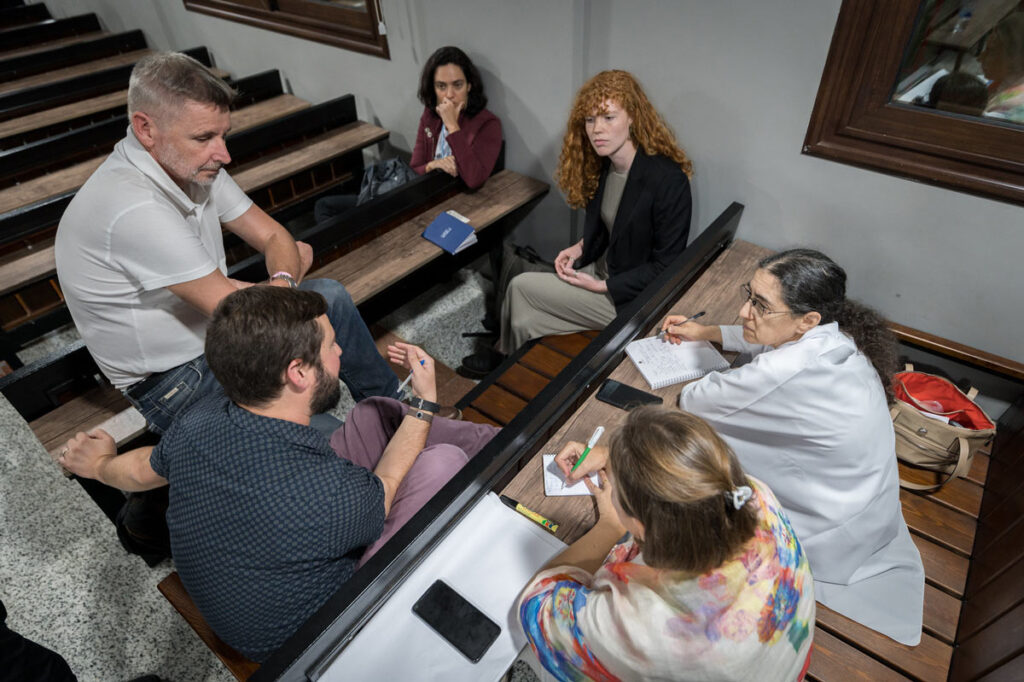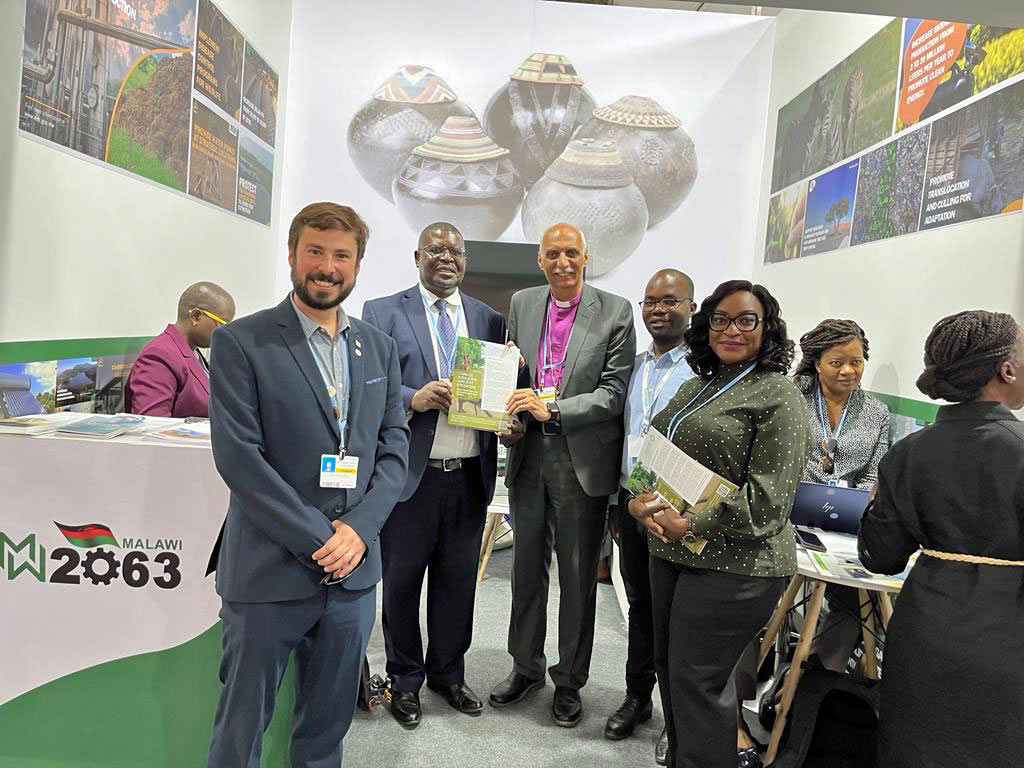Good COP? Bad COP?
A delegation from the worldwide Anglican Communion was seeking climate justice at COP27. Mission partner Joel Kelling was there.
Photo: Archbishop Samy Fawzi speaks at the Interfaith Liaison Committee press conference during COP27 (ACT Alliance/Simon Chambers)
For the past two weeks I became one of approximately 45,000 temporary residents of Sharm el-Sheikh, at the base of the Sinai peninsula, for the COP27 climate change conference.
by Joel Kelling, CMS mission partner
I was there with the Anglican Communion delegation, supporting Archbishop Samy Fawzi of Alexandria, Archbishop Julio Murray of Panama, Amal Sarah, a young Pakistani woman from the Diocese of Raiwind, who has been responding to the recent catastrophic flooding in the country, and Dr Rose Elu, from the Torres Straight Islands, engaged in work for the wellbeing of Aboriginal and Torres Straight Islander people in Australia.
As a delegation we brought the lived experience of the impact of climate change to the COP. My role was to support, organise and record our team, connecting them with other delegations and the media and capturing their thoughts and experiences of the two weeks.
Making our voice heard
We were there to engage with national delegations and collaborate with ecumenical partners and other peoples of faith to call for greater ambition and justice regarding climate change: for fairer access to climate financing, and the establishment of a loss and damage facility to help less developed countries respond to the damage being done to their homelands because of the historic activity of more heavily industrialised nations.

The approach of having two (distinctly tall) men in episcopal purple seemed to have a positive impact on our visibility, with many delegates reaching out to ask why we were present (we shared our policy paper with those we met).
My existing work with the ACT Alliance on climate justice was really helpful, as they filmed interviews with the bishops and developed the faith leaders’ letter that they both signed (and were featured in the Church Times).
We were also able to reach out to national delegations, utilising our wider Anglican and Christian connections to meet with the prime minister of Uganda and ministers from Germany and Malawi.
United in faith
We were delighted to join with Christians from the ACT Alliance, Caritas, Christian Aid, the Climate YES youth action, DanMission, Green Anglicans movement, Renew our World and Tearfund and the World Council of Churches, to amplify our shared voice.
My friend and UN conference veteran Matthias Boehning, co-director of the World Evangelical Alliance Sustainability Center, has commented that he had “not [previously] experienced such a level and depth of faith-inspired content”.

The local Coptic Orthodox Church hosted an ecumenical service on the middle Sunday of the conference as well as a Talanoa dialogue (sharing of ideas, skills and experience through storytelling) of people from a variety of faiths. Through this, Dr Rose and Archbishop Samy were able to meet with the UNFCCC (United Nations Framework Convention on Climate Change) secretariat, again reiterating the importance of nations listening to the voice of people of faith – particularly when we make up 84 per cent of the world!
Focus on justice
It was wonderful to see Archbishop Julio lead a prophetic cry for justice during the climate march on the Saturday; a clear and urgent voice that was heard by so many, people of faith and none. It was wonderful too to break bread together with other Christians, particularly at the Anglican family meal I organised, as well as the Renew Our World group, Tearfund team, and ACT Alliance.
We were able to speak beyond the boundaries of the conference too, interviewed by reporters from Norway, Sweden, Malawi and both secular and religious broadcasters from the Arab world, including SAT-7.

One of the fantastic opportunities of this year and next is to really engage the Christian presence in the Middle East, as the focus shifts from Africa to Asia for COP28 next year, which will be in the UAE in Dubai. The work I’ve been doing with the Middle East Council of Churches around the Season of Creation, and with the Lausanne Creation Care network seeks to engage more Christians in local and global responses to creation care from within the region.
Disappointed… and hopeful
The progress at the conference itself was very mixed. The much-needed progress on stopping the future exploitation of fossil fuels was not addressed, and there was no further progress on getting to the full $100 billion per year previously committed by wealthy countries to help vulnerable countries adapt to climate change. However, we really must celebrate the establishment of a Loss and Damage fund, the first time it has appeared on the formal agenda at a COP, despite it being discussed for many years.
As the conference moved into the more private negotiations, we as Christian organisations turned our attention to next year and how we can amplify our voice inside the conference, perhaps in the form of a pavilion, where we could host both side-events and a prayer space.
I need to begin coordinating with the Anglican presence in the UAE on how we can help host the Christian presence and support worship and prayer throughout COP28 for observers like us and delegates alike.
There is much work to be done, and time is really running out for equitable and meaningful solutions. But despite some disappointments, I remain hopeful and remain in prayer for climate justice.